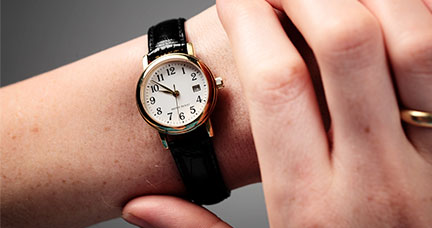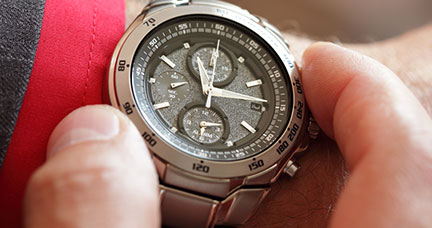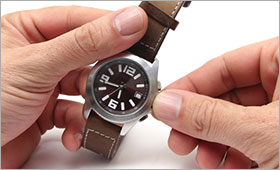Watch Maintenance
While a watch can last for many years and even generations, like anything else, it does endure some wear and tear over time. Bucherer’s watch Service and Repair experts have provided their professional advice and tips to help you keep your watch in the same excellent condition in which it was bought.
General Cleaning
Maintenance Schedule
Winding and Setting
Batteries
Water Resistance
Things to Avoid
General Cleaning
Keeping your watch clean on the outside lessens the chance of it getting dirty on the inside. Wipe off your watch periodically to remove dust, dirt, moisture and perspiration.

Cleaning a NON water-resistant watch:
- Avoid exposure to any moisture.
- Simply wipe the watch with a dry soft cloth.

Cleaning a water-resistant watch:
- Use a soft damp cloth to clean the head of the watch and then wipe off with a dry soft cloth.
- Metal bracelets can be cleaned by using mild soapy water and a soft toothbrush.
MAINTENANCE SCHEDULE
In addition to an annual 5 Point Check-Up, a complete movement overhaul is recommended every three to five years to keep your watch in pristine condition.
Schedule a store visitWinding and Setting

For A Manual Watch:
- Wind your watch fully at the same time each day.
- Be careful not to force the crown. When it stops, or you feel resistance, stop winding. Forcing the crown can damage the setting mechanism.

For An Automatic Watch:
For optimal performance, the automatic watch is to be worn every day and 'be active.'
- To power up an automatic timepiece, give the crown about 20 to 40 turns and put the watch on your wrist.
- If the watch has a screw-down crown, be sure to secure it after the watch has been wound and set to ensure the water- tight integrity of the watch.
- If the automatic watch is worn daily, wind it once every two weeks. Wind the watch twice a week if it is not worn daily.

For Setting The Date:
- Avoid setting the date between 9 pm and 3 am as doing so can damage the movement's gears and pinions.
- Be sure to adjust the date outside of this time period.
Batteries
The average life of a quartz watch battery is 1 to 3 years. The life of the battery is dependent on a number of factors: age, condition of the movement, and the type of watch—analog/chronograph or digital. The more functions a watch has, the more frequent the need for battery replacements. When a battery can no longer power the watch, change it promptly. Otherwise, you run the risk of the battery leaking and causing damage to the mechanism.
WATER RESISTANCE

Not all watches are designed to be water resistant, and there are various degrees of water resistance. It is important to remember that water resistance is not a permanent condition, and it must be tested and renewed periodically. Gaskets and seals used to seal the watch deteriorate over time and will need to be replaced.
Have your watch tested every 12 − 18 months for water resistance. Bring your watch to a Bucherer store for repair if there is ever condensation under the crystal or signs of oxidation on the dial.
Swimming with your watch:
- If your watch is designed for water activities, be sure the crown is pushed down or screwed in tightly before wearing it in water.
- While in a moist environment, do not operate or adjust the crown and/or push buttons as water can seep into the case.
- After contact with chlorinated or salt water, immediately clean the watch with fresh water and dry with a soft cloth.
- If the watch has a 'rotating bezel,' be sure to rotate the bezel while cleaning to dislodge any debris (sand or salt).
Things to Avoid
1. Impacts
Sudden shocks or impacts to your watch may result in possible damage to the case, movement, crystal, dial and hands, as well as void your warranty. When the unfortunate happens, the watch may no longer function as desired and will require service.
There are times when the impact is such that there is no physical evidence on the outside of the case indicating the watch has experienced a shock. Only a watch service center with trained expert watchmakers can diagnose the cause and advise you on a course of action to correct the problem.
2. Extreme Temperatures
Moisture and drastic temperature changes and temperatures above 60°C/140°F and below 0°C/32°F can affect timekeeping and water resistance to most watches.
3. Magnetic Fields
Mechanical watches exposed to anything containing a magnet can and will cause these watches to run incorrectly. The watch may run fast, slow, or even stop.
Avoid placing your watch on or near permanent magnets, as found in speakers, computers, magnetic hooks on refrigerators, etc. One of the most common culprits is the cell phone.
Bring your watch to a Bucherer service expert to have it quickly demagnetized. If the watch is severely magnetized, a complete maintenance of the movement may be necessary.
4. Chemicals
Direct contact with chemicals, such as cosmetics, perfumes, detergents, solvents etc. may damage the case, gaskets, leather strap, and/or bracelet of a watch.





